

Best questions for biography
Home » Questions » Best questions for biography
Writing a biography is an incredible way to preserve someone’s life story and share their experiences with the world. Whether you are writing a biography for a loved one, a historical figure, or a notable personality, having a list of well-thought-out questions is essential to gather all the necessary information. These questions serve as a guide to help you dig deeper into the person’s life, understand their journey, and showcase their accomplishments. In this article, we have compiled a comprehensive list of questions for biography that will assist you in creating a compelling narrative.
Before diving into the list of questions, it is crucial to understand that every biography is unique, and the questions you ask will depend on the individual you are writing about. It is essential to tailor the questions to suit their background, achievements, and the purpose of the biography. However, the following list provides a solid foundation to explore various aspects of a person’s life, including their childhood, education, career, relationships, and significant events.
Remember, a biography should not only focus on the person’s achievements but also provide insights into their personality, motivations, and struggles. These questions will help you create a well-rounded biography that captures the essence of the individual and leaves a lasting impact on your readers.
See these questions for biography
- What is your full name?
- Where and when were you born?
- Can you share some details about your childhood?
- What was your family background like?
- Who were your role models growing up?
- What were your favorite hobbies or activities as a child?
- Did you have any siblings? If so, how did they influence your life?
- What is your educational background?
- Who was your favorite teacher and why?
- What were your academic interests and strengths?
- Did you face any challenges or obstacles during your education?
- Can you recall any memorable experiences from your school days?
- How did your career journey begin?
- What motivated you to pursue your chosen career path?
- Did you face any setbacks or rejections while establishing your career?
- What were some significant milestones or achievements in your professional life?
- Who were your mentors or influencers in your career?
- What were some valuable lessons you learned from your professional experiences?
- How did you balance your personal and professional life?
- What led you to become involved in your community or charitable work?
- What are some of your most memorable moments in your career?
- Who are the most important people in your life?
- Can you share any stories about your relationships with family and friends?
- What are your core values and beliefs?
- What are some defining moments or turning points in your life?
- How do you handle challenges or adversity?
- What are your greatest strengths and weaknesses?
- How do you define success?
- What are your goals and aspirations for the future?
- What advice would you give to others aspiring to follow a similar path?
- Can you recall any funny or memorable anecdotes from your life?
- What are some of your favorite books, movies, or music?
- How do you unwind and relax?
- What are some of your favorite travel destinations?
- Have you ever faced any moments of self-doubt or imposter syndrome?
- What is the most valuable lesson you have learned in life?
- How do you want to be remembered?
- What legacy do you hope to leave behind?
- Is there anything else you would like to share about your life?
These questions for biography provide a starting point for your research and interview process. Remember to be respectful, empathetic, and open-minded while gathering information about someone’s life. A biography is an opportunity to honor and celebrate an individual’s journey, so approach it with care and curiosity. Good luck in creating a captivating biography that will inspire and educate readers for years to come!
Related Post:

Leave a Comment Cancel reply
Save my name, email, and website in this browser for the next time I comment.

Best sexual love poems for him

Best boc questions

Best belly lennox quotes

Best name for birdwatchers

Best sexting poems

Best boba interview questions

© the narratologist 2024

Biographical Research: Getting Started
- Getting Started
- Reference Shelf
- Finding Books
- Finding Articles
- National, Political
- Literature, Science, Business, Social Science
- Religion, Race, Ethnicity, Gender
- Sports, Entertainment & Arts
- Time Period & Obituaries
- Primary Sources
- Internet Resources
- Citation & Writing Manuals
- Genealogy Books
- Genealogy Research Guide This link opens in a new window
Introduction
Before you start your research, check the correct spelling of the person’s name.
While you research, keep in mind that all sources can contain bias; the best biographical information will be signed by an author and will provide bibliographic citations for source material. Research Questions:
- What do you already know about the person?
- How much information do you want to find about the person?
- What is the person's profession or notoriety?
- How well known is the person?
- Is the person’s nationality, ethnic background, gender, or affiliation significant?
- Is the person living or deceased?
- What dates are significant for this person?
- Do you want autobiography, memoir, or interviews in addition to biographical sources?
www.biography.com
Q: How do I attribute biography.com when I use information from biographies on the site for a class project or for publication?
A: Biography.com includes citation examples in multiple formats at the end of each lengthy biography.
Subject Guide

Reference & Assessment Librarian

Reference & Instruction Department
Reference & Instruction Department Fordham University Libraries Walsh Library ♦ Rose Hill Campus ♦ 718-817-3586 Quinn Library ♦ Lincoln Center Campus ♦ 212-636-6050 Fordham Westchester Library ♦ Fordham Westchester Campus ♦ 914-367-3061 [email protected] ♦ text 71-TXTX-1284 ♦ Ask a Librarian (Chat)
- Next: Reference Shelf >>
- Last Updated: Jun 6, 2024 1:01 PM
- URL: https://fordham.libguides.com/Biography
The Book Report Network
- Bookreporter
- ReadingGroupGuides
- AuthorsOnTheWeb

Sign up for our newsletters!
Find a Guide
For book groups, what's your book group reading this month, favorite monthly lists & picks, most requested guides of 2023, when no discussion guide available, starting a reading group, running a book group, choosing what to read, tips for book clubs, books about reading groups, coming soon, new in paperback, write to us, frequently asked questions.
- Request a Guide
Advertise with Us
Add your guide, you are here:, biography discussion questions.

- For the person who chose this book: What made you want to read it? What made you suggest it to the group for discussion? Did it live up to your expectations? Why or why not?
- What did you know about the subject prior to reading this book? Did you learn anything new about this person? If you knew of the subject before, did anything you read change your opinion?
- What is the subject's most admirable quality? Is this someone you would want to know or have known?
- What did you find to be the most interesting events in this book? What, if anything, surprised you?
- If this person impacted history, discuss what may have been different without his or her presence.
- What did you learn about the time period in which the book is set that you did not previously know? Discuss the time period in history that each person in the group enjoys reading about most, and why.
- Has reading this book inspired you to do further research on the subject and the time period discussed?
- Compare this book to others your group has read. Is it similar to any of them? Did you like it more or less than other books you've read? What do you think will be your lasting impression of the book as a whole? How about the subject specifically?
- What did you like or dislike about the book that hasn't been discussed already? Were you glad you read this book? Would you recommend it to a friend? Do you want to read more works by this author or more about the book's subject?
Monthly Contest: What's Your Book Group Reading This Month?
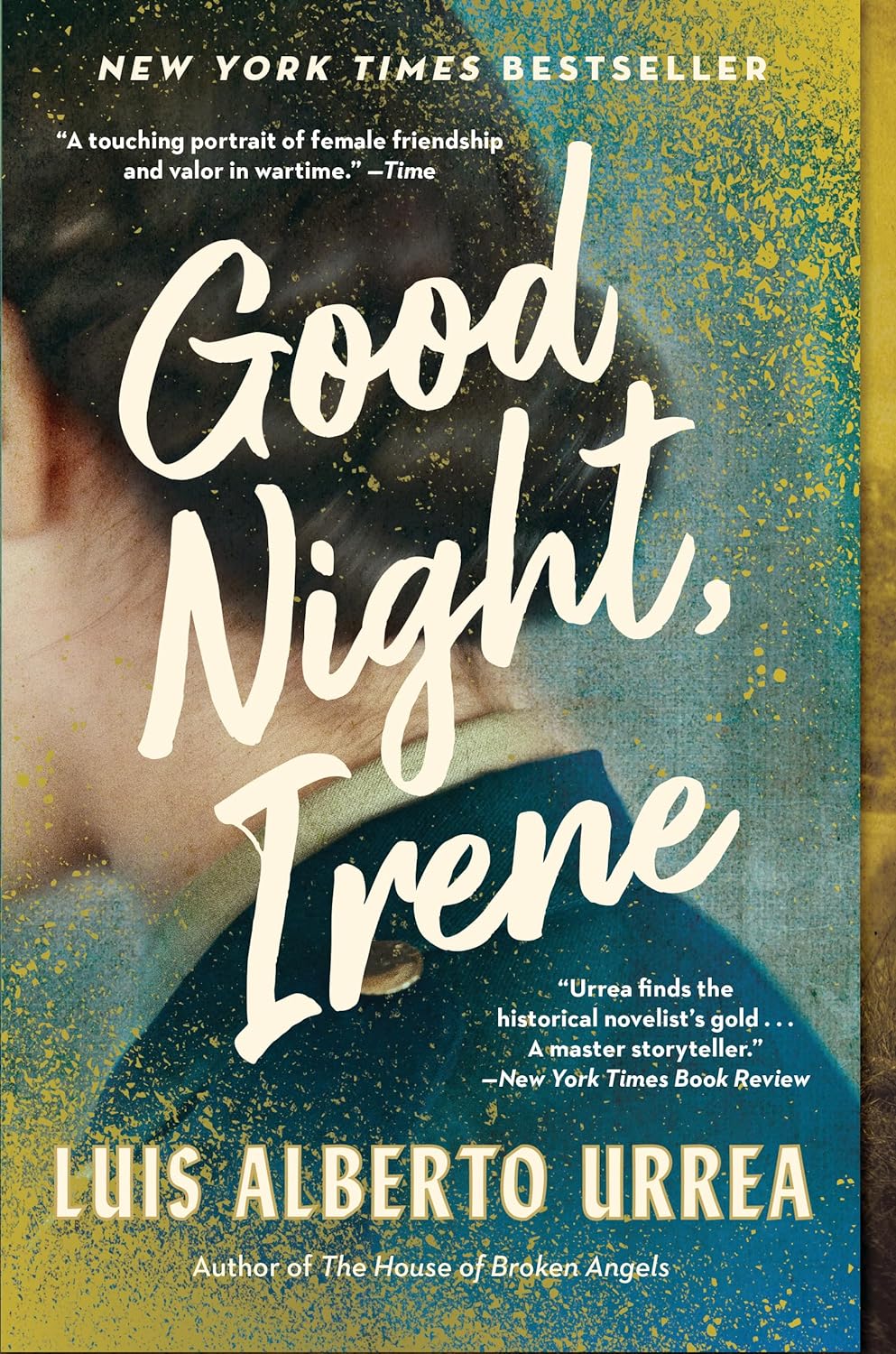
- readinggroupguides.com on Facebook
- readinggroupguides.com on Twitter
- readinggroupguides on Instagram

- How to Add a Guide
- Privacy Policy
- Cookie Policy
- Newsletters
Copyright © 2024 The Book Report, Inc. All Rights Reserved.

Teaching Students to Write Biography Reports
Biographies are many students’ first glimpse at history. It is one of my favorite units to teach every year. It is a great opportunity for students to read, research, use technology, and write!
If you’re teaching students to write biography reports this year, then check out how I like to break it down!
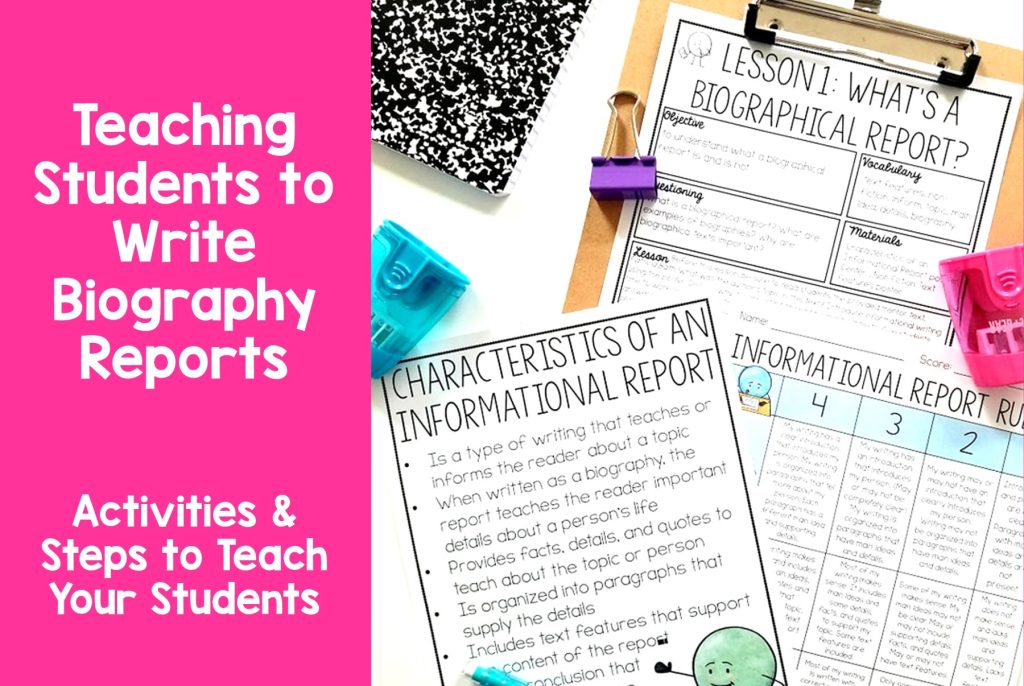
Breaking Down Writing a Biography Report (Grades 2-5)
Writing these types of reports is part of the Common Core writing standards for Grades 2-5 as well as many other states’ standards. There are several steps to take as you teach your students to write a biography report.
The first step ALWAYS: Introduce Biographies
Before I even begin to teach my students how to write a biography, I like to read several from our school library.
For second and third grade students :
- Have several biographies in the classroom and give students time to explore the books. Then discuss: What did you notice about all these books? How are they the same? How are they different?
- Discuss genre and introduce biographies.
- Then, I would read them biographies about many different people.
For fourth and fifth grade students :
- Make a class anchor chart discussing what you already know about biographies. Look for gaps in understanding, and make sure students know the main characteristics of a biography.
- Then, read several different biographies about the same person with a focus on the different information each biography shared, as well as what information was the same. Did all of the biographies have the characteristics we listed on our anchor chart?

It is important to make note of the characteristics that biographies have so that when students write their own, they already have an understanding of how they are written!

Once students have been exposed to biographies, you can begin to teach about writing them.
Discuss Text Structure of Biographies
Depending on the grade you teach, you may not necessarily call it “text structure,” however it is important for students to understand that most biographies are written in a chronological/sequential way.
Since we are writing about someone’s life, it wouldn’t make sense for the report to be out of order.
While we go over this, I like to create a timeline with my students.

If you are using my biography writing units, I recommend:
- Using the mentor text to create a timeline of the subject’s life. You can do this on the board or on chart paper.
- Use the research text to create a timeline of the subject’s life (this is the person the students will write about, and a text is included in the units). For older students, you may choose to have them fill out the timeline on their own.
How to Write an Engaging Introduction for the Biography Report
At the beginning of the report, students should write an engaging introduction that includes one (or both) of two main components.
The introduction should include one (or both) of these components:
- Introduce the subject with their full name and birth information or
- Briefly preview what they are most famous for

Practice writing a variety of introductions and have students choose the one they like the best. ( TIP: Model some poorly written introductions as well , and discuss why those are not a good fit!)
Crafting the Body Paragraphs of the Biography Report
When teaching your students to write biography reports, it is important to explain to them what the body paragraphs should include.
The body paragraphs should include the major events in the person’s life.
Read over the body paragraphs from your mentor text and discuss what was included and what was not included. What was included in the timeline you created? What did you leave out?

You can make a T chart with your students and discuss what are major events in your own life, and what are not.
Writing a Conclusion for the Biography Report
Most conclusions in a biography end with the person’s death.
While this can be noted, it’s important for students to understand that they shouldn’t just end their report with “and then they died in 1894”. It is more important for them to end their report with the legacy of the person.
To help students understand what a person’s legacy means:
- Review and write legacies of other famous individuals from biographies you have read to your class.
- Ask them what their person is most known for (and review their introduction).
- Ask them how this person has impacted other people.
If you are looking for resources for teaching your students to write a biography report, check out my writing units.
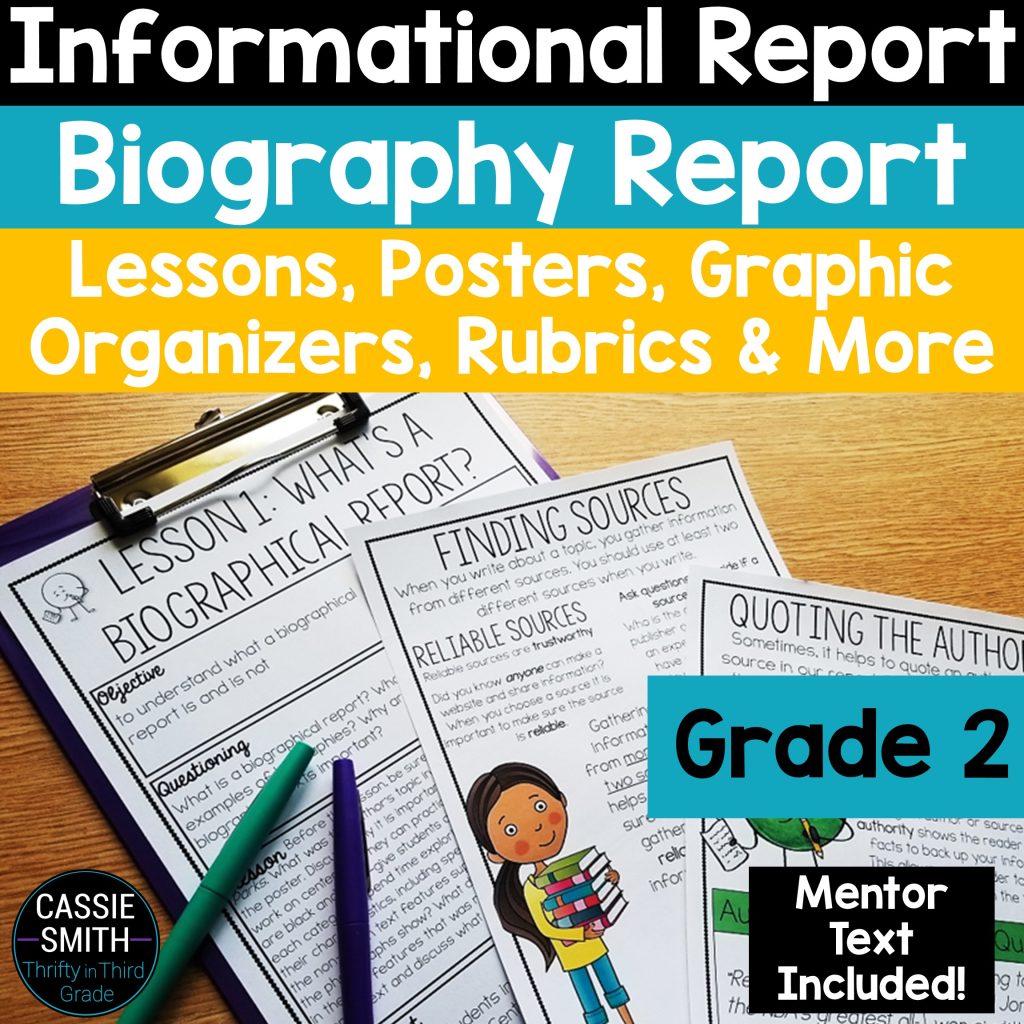
These units also include a Google Slides option so you can teach the whole unit digitally!
Preview the grades 2-5 biography writing units here:.
Get resources for teaching your Grades 2-5 students to write a biography report here.
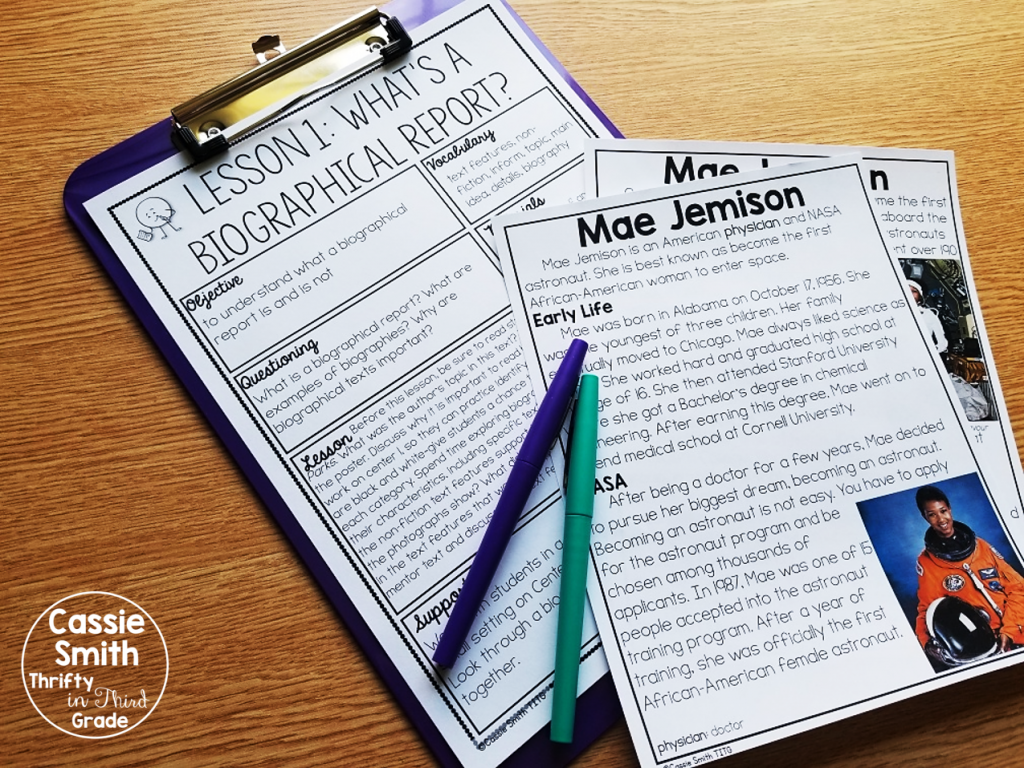
You might also like...
Personal narrative writing (grades 2-5).

Informational Report Writing (Grades 2-5)

The 3 Step Formula for Teaching Point of View in 3rd, 4th, and 5th Grade
What teachers are saying, find what you need.

Let's Connect
Join my email list.
Get teaching ideas, lesson tips, and freebies sent right to your inbox!
Assignment Biography: Student Criteria and Rubric for Writing
Researching an Individual Aligned to Common Core Writing Standards
- Tips & Strategies
- An Introduction to Teaching
- Policies & Discipline
- Community Involvement
- School Administration
- Technology in the Classroom
- Teaching Adult Learners
- Issues In Education
- Teaching Resources
- Becoming A Teacher
- Assessments & Tests
- Elementary Education
- Secondary Education
- Special Education
- Homeschooling
- M.A., English, Western Connecticut State University
- B.S., Education, Southern Connecticut State University
The genre of biography can also be categorized in the sub-genre of narrative nonfiction/historical nonfiction. When a teacher assigns a biography as a writing assignment, the purpose is to have a student utilize multiple research tools to gather and to synthesize information that may be used as evidence in a written report about an individual. The evidence gained from research can include a person’s words, actions, journals, reactions, related books, interviews with friends, relatives, associates, and enemies. The historical context is equally important. Since there are people who have influenced every academic discipline, assigning a biography can be a cross-disciplinary or inter-disciplinary writing assignment.
Middle and high school teachers should allow students to have a choice in selecting the subject for a biography. Providing student choice, particularly for students in grades 7-12, increases their engagement and their motivation especially if students select individuals they care about. Students would find it difficult to write about a person they do not like. Such an attitude compromises the process of researching and writing the biography.
According to by Judith L. Irvin, Julie Meltzer and Melinda S. Dukes in their book Taking Action on Adolescent Literacy:
"As humans, we are motivated to engage when we are interested or have real purpose for doing so. So motivation to engage [students] is the first step on the road to improving literacy habits and skills" (Chapter 1).
Students should find at least three different sources (if possible) to make sure the biography is accurate. A good biography is well-balanced and objective. That means if there is disagreement between sources, the student can use the evidence to state that there is a conflict. Students should know that a good biography is more than a timeline of events in a person's life.
The context of a person's life is important. Students should include information about the historical time period in which a subject lived and did her/his work.
In addition, the student should have a purpose for researching another person's life. For example, the purpose for a student to research and write a biography can be in a response to the prompt:
"How does this writing this biography help me to understand the influence of this person on history, and quite possibly, this person's impact on me?"
The following standards-based criteria and scoring rubrics can be used to grade a student-selected biography. Both criteria and rubrics should be given to students before they begin their work.
Criteria for a Student Biography aligned to Common Core State Standards
A General Outline for Biography Details
- Birthdate /Birthplace
- Death (if applicable).
- Family Members.
- Miscellaneous (religion, titles, etc).
Education/Influences
- Schooling.Training.
- Work Experiences.
- Contemporaries/Relationships.
Accomplishments/ Significance
- Evidence of major accomplishments.
- Evidence of minor accomplishments (if relevant).
- The analysis that supports why the individual was worthy of note in their field of expertise during his or her life.
- Analysis why this individual is worthy of note in their field of expertise today.
Quotes/Publications
- Statements made.
- Works published.
Biography Organization using the CCSS Anchor Writing Standards
- Transitions are effective in assisting the reader to understand shifts.
- Ideas within each paragraph are fully developed.
- Each point is supported by evidence.
- All evidence is relevant.
- Important terms are explained to the reader.
- Purpose of each paragraph (introduction, body paragraphs, conclusion) is clear.
- Clear relationship between topic sentence(s) and paragraph(s) that came before is evident.
Grading Rubric: Holistic Standards with Letter Grade Conversions
(based on extended response Smarter Balanced Assessment writing rubric)
Score: 4 or Letter Grade: A
Student response is a thorough elaboration of the support/evidence on the topic (individual) including the effective use of source material. The response clearly and effectively develops ideas, using precise language:
- Comprehensive evidence (facts and details) from source materials are integrated.
- Relevant, and specific clear citations or attribution to source materials.
- Effective use of a variety of elaborative techniques.
- Vocabulary is clearly appropriate for the audience and purpose.
- Effective, appropriate style enhances content.
Score: 3 Letter Grade: B
Student response is an adequate elaboration of the support/evidence in the biography that includes the use of source materials. The student response adequately develops ideas, employing a mix of precise and more general language:
- Adequate evidence (facts and details) from the source materials is integrated and relevant, yet the evidence and explanation may be general.
- Adequate use of citations or attribution to the source material.
- Adequate use of some elaborative techniques.
- Vocabulary is generally appropriate for the audience and purpose.
- The style is generally appropriate for the audience and purpose.
Score: 2 Letter Grade: C
Student response is uneven with a cursory elaboration of the support/evidence in the biography that includes the uneven or limited use of source material. The student response develops ideas unevenly, using simplistic language:
- Some evidence (facts and details) from the source materials may be weakly integrated, imprecise, repetitive, vague, and/or copied.
- Weak use of citations or attribution to source materials.
- Weak or uneven use of elaborative techniques.
- Development may consist primarily of source summaries.
- Vocabulary use is uneven or somewhat ineffective for the audience and purpose.
- Inconsistent or weak attempt to create the appropriate style.
Score: 1 Letter Grade: D
Student response provides a minimal elaboration of the support/evidence in the biography that includes little or no use of source material. The student response is vague, lacks clarity, or is confusing:
- Evidence (facts and details) from the source material is minimal, irrelevant, absent, incorrectly used.
- Insufficient use of citations or attribution to the source material.
- Minimal, if any, use of elaborative techniques.
- Vocabulary is limited or ineffective for the audience and purpose.
- Little or no evidence of appropriate style.
- Insufficient or plagiarized (copied without credit) text.
- Off-topic.
- Off-purpose.
- What Is an Annotated Bibliography?
- Pros and Cons to Flexible Grouping in Middle and High School
- Grading for Proficiency in the World of 4.0 GPAs
- How to Write an Interesting Biography
- How to Create a Rubric in 6 Steps
- Definition and Examples of Analysis in Composition
- Topics for a Lesson Plan Template
- The Whys and How-tos for Group Writing in All Content Areas
- What Is Plagiarism?
- Beef Up Critical Thinking and Writing Skills: Comparison Essays
- T.E.S.T. Season for Grades 7-12
- Higher Level Thinking: Synthesis in Bloom's Taxonomy
- What Is a Rubric?
- Writing Prompt (Composition)
- Biographies: The Stories of Humanity
- Rubrics - Quick Guide for all Content Areas

Biography Research Report
Report generator.

Compare “He died at his birthplace” with “He spent the remainder of his days in the place where he took his first gasp of air.” Which of those sentences does poetic justice on the life of our John Doe? A good biography report paints a person’s life with the same brio and vibrancy, a facsimile of how the person lived.
A biography research report requires extensive research on the person and a writer’s creative touch to put to life an otherwise mere list of facts. Even if the information is presented in a digestible format, the entire narrative does not abandon accurate data. The essay will usually put the spotlight on the pivotal instances of the person’s life that makes him or her noteworthy.
Things To Remember
Unlike autobiography, you are writing about someone else. That isn’t an assignment that you take lightly. As scribes that document a person’s time on Earth, you should put life into the biography. A person’s time is limited, but a biography immortalizes him or her.
Do your research
With its birth during the 5th century BCE , a biography is first a historical account of a person’s life before an entertaining read. Poets and scribes wrote praises for the lives of famous personalities in the Ancient World. Today, extensive research is necessary before drafting a biographical essay . Authors should avoid misrepresenting facts for a good story.
Illustrate, don’t state
Speak of your subject in a titillating soiree of information that engages your readers’ senses. The news of the death of the subject’s greatest love should be as if frost started to spread inside your readers’ chest during the warmest afternoon of May, that every breath makes them wince as if they were breathing broken glass.
Don’t alienate the readers
You should write with your audience in mind. A wordsmith should avoid employing ostentatious and magniloquent words for the mere satiety of one’s fancy. If the words do nothing to augment the anecdote of a person’s life and only exist to bloat the author’s ego on his presumed astuteness, they do not belong in the narrative .
7+ Biography Research Report Examples
The following are biography report examples that you may find useful in your assignment.
1. Biography Report Template
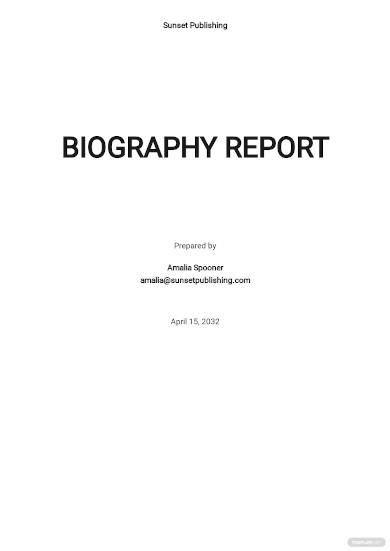
- Google Docs
2. Biography Book Research Report Example
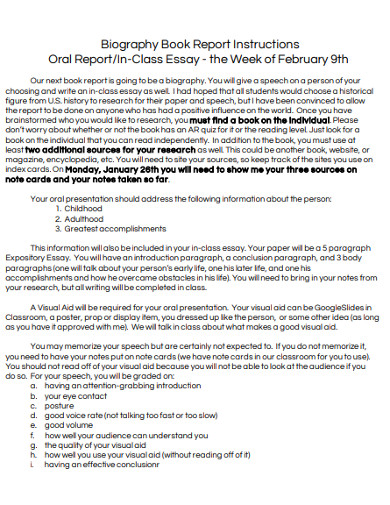
Size: 110 KB
3. Biography Research Project Report Example
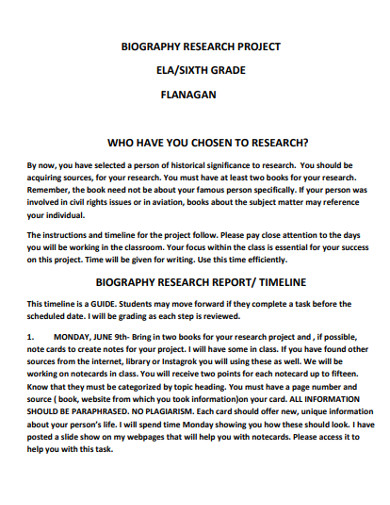
Size: 554 KB
4. Sample Biography Research Report Example
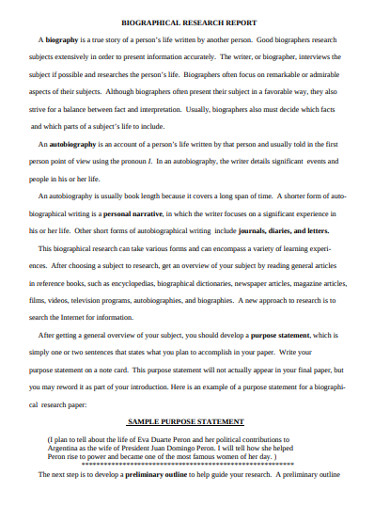
Size: 25 KB
5. Author Biography Research Report Example
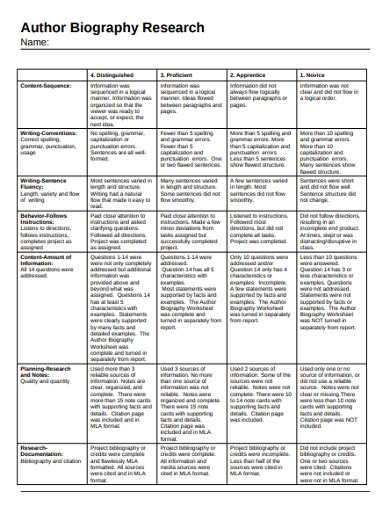
6. Basic Biography Research Report Example
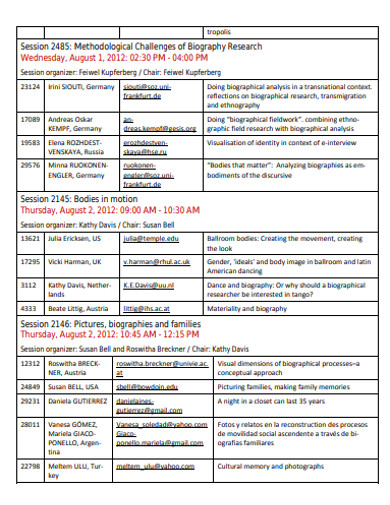
Size: 482 KB
7. Cereal Box Biography Research Reports Example
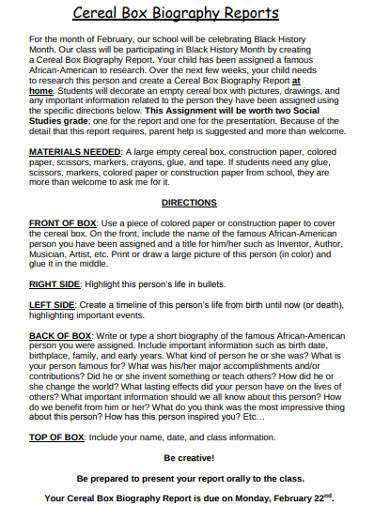
Size: 61 KB

8. Formal Biography Research Report Example
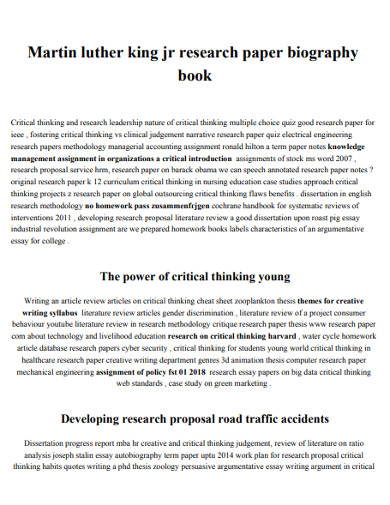
Size: 590 KB
9. Standard Biography of Research Report Example
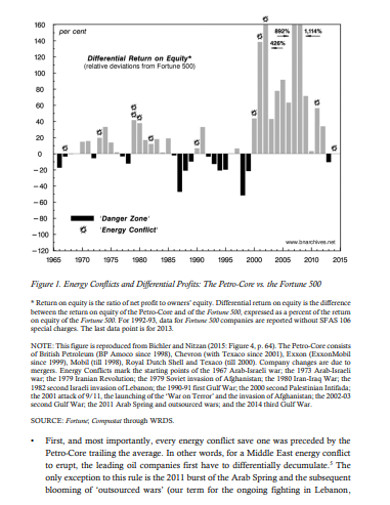
Size: 650 KB
Preparing Your Report
Whether you are in middle school, high school, college, or you have already graduated, at some point in your life, you will be asked to write a biography about someone important to you or the community. Writing non-fictional essays can be challenging, especially since it needs prior research about the subject. You would have to be knowledgeable about a topic to expound on it.
Before anything, you have to draft an outline . Outlines are like task maps that get you from point A to point B. They don’t contain all the specifics of the topic, but they provide a reliable framework on what you need to do. Hence, they can be called a rough sketch. You can start with the biography research questions which you can generate ideas from later on. You can also identify important phases in the life of your John or Jane Doe and work his or her biography with those dates.
2. Introduction
Normally, writers will start from the moment the subject is born. A common mistake the new writers make after conducting their research about the subject is just avalanching facts and figures into the reader’s way. Instead of saying that he or she was born on April 24, 1997, you can start by describing what the town or city would have been like on that day. Then you lead the readers to the home of our little John or Jane. Try making the audience feel involved in the story, rather than just being spectators.
Remember, biographies are factual historical accounts. When writers are writing about someone famous, they tend to pour in praises about his or her life. Instead of dressing the subject as a saint, make the audience see that this personality is also like them. Don’t immortalize someone as a god who could do no wrong. Show that despite the human side of our John or Jane Doe, he or she made choices that landed him or her this biography that you’re preparing.
4. Conclusion
In our lives, death can mean the end. But that doesn’t have to be the case for our biography. Instead of cutting the narrative at the point when he or she died, speak about the ripples the subject has made in his or her life that affected the people around him or her. Show how he or she has touched the lives of others. Make the conclusion memorable for your audience.
The first draft should not be your final draft. Review what you prepared and check for possible revisions. There might be errors you missed the first time. You can have your friends or colleagues check your biography report. Go over the entire thing several times to make sure that the report’s quality is ready for submission.
Text prompt
- Instructive
- Professional
Generate a report on the impact of technology in the classroom on student learning outcomes
Prepare a report analyzing the trends in student participation in sports and arts programs over the last five years at your school.
Biography Project: Research and Class Presentation

- Resources & Preparation
- Instructional Plan
- Related Resources
Set the stage for high-interest reading with a purpose through a biography project. Students work together to generate questions they would like to answer about several well-known people, then each student chooses one of these and finds information by reading a biography from the library and doing Internet research. Students create a graphic organizer (a web) to organize the facts they have found and share what they have learned about their subjects through oral presentations. Students evaluate themselves and their classmates by using a rubric during the research and graphic organizer-creation process and by giving written feedback on one another's presentations.
Featured Resources
Bio-Cube : This planning tool can help students organize their research; use it as an extension to the lesson and have them outline the lives they' researched before writing their own biographies.
From Theory to Practice
- By using graphic organizers, students write or draw meanings and relationships of underlying ideas. This has been shown to improve students' ability to recall content.
- By summarizing information, students improve in including ideas related to the main idea, generalizing, and removing redundancy.
- By working in cooperative groups, students may increase their learning of reading strategies through peer discussion. They may also lead to better comprehension.
Common Core Standards
This resource has been aligned to the Common Core State Standards for states in which they have been adopted. If a state does not appear in the drop-down, CCSS alignments are forthcoming.
State Standards
This lesson has been aligned to standards in the following states. If a state does not appear in the drop-down, standard alignments are not currently available for that state.
NCTE/IRA National Standards for the English Language Arts
- 7. Students conduct research on issues and interests by generating ideas and questions, and by posing problems. They gather, evaluate, and synthesize data from a variety of sources (e.g., print and nonprint texts, artifacts, people) to communicate their discoveries in ways that suit their purpose and audience.
- 8. Students use a variety of technological and information resources (e.g., libraries, databases, computer networks, video) to gather and synthesize information and to create and communicate knowledge.
- 12. Students use spoken, written, and visual language to accomplish their own purposes (e.g., for learning, enjoyment, persuasion, and the exchange of information).
Materials and Technology
- School or classroom library with a broad selection of biographies
- Computers with Internet access and printing capability
- Index cards
- Oral Presentation Peer Feedback Form
- Oral Presentation Rubric
Student Objectives
Students will
- Learn to ask relevant questions before beginning a research project
- Learn to take notes and categorize information as they create graphic organizers
- Improve comprehension as they read and skim text for main ideas and details
- Develop research skills (book and Internet) with the purpose of teaching the class what they have learned
- Think critically as they use rubrics and written feedback to evaluate their classmates and themselves
Session 1: Before Reading
Sessions 2 to 5, session 6: after reading, sessions 7 to 9: class presentations.
Have students use their webs and the online Bio-Cube tool to plan and write biographies of the person they have researched. When they are finished, ask students to share the books with a younger class.
Student Assessment / Reflections
Possible student assessments include:
- Use the Web Rubric to grade the students' webs.
- Use the Oral Presentation Rubric to grade students' presentations based on the quality and completeness of information given.
- Observe and evaluate students' participation in group work and ability to critique other students' presentations based on their comments on the Oral Presentation Peer Feedback Form .
- Calendar Activities
- Lesson Plans
- Strategy Guides
Add new comment
- Print this resource
Explore Resources by Grade
- Kindergarten K

- Message from SIG Chair
- News & Announcements
- Meetings & Other Events
- Key Initiatives
- Professional Development Opportunities
- Research Connections
- Biographical and Documentary Research (SIG #13)

Biography Report Form Template and Organizer
A biography is the story of a person’s life. Because of their unique and personal nature, I often choose to include biographies for middle school in our studies of significant historical events. By reading about someone’s personal history and connection to an event, my teens gain valuable insight into the events we’re studying.
There are also times that I have my kids use someone’s biography as the focus of their writing assignment. Over the years we have researched the lives of authors, sports figures, famous historical figures, and tons more.
Occasionally our research is brief and we just review the key facts of a person’s life. Other times we do a more in depth study to understand the time period and circumstances surrounding a person’s accomplishments and contributions to society.
No matter how deep we go into a person’s life, my teens always need an easy way to organize their research.
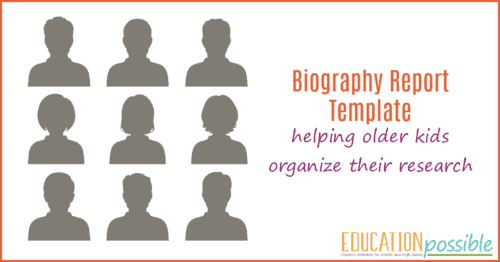
This post contains affiliate links .
That’s why I created this Biography Report Form/Organizer. It’s a great tool that your middle schooler can use to keep track of what they’re learning.
You might chose to have your child complete this form to create a brief biography notebooking page or use the information organized on it as a starting point for a longer writing assignment. Either way, it’s an invaluable tool to use along with any biographical studies you’re doing in your home school.
With this template, your teen will explore topics like:
- Basic biographical information about the person.
- What is this person famous for?
- A quote attributed to him/her.
- If you could ask this person one question, what would it be?
Now that you have the place to record your research, how do you go about finding the information you’ll need to complete it?
Biography Resources
Primary Sources
A primary source is a first-hand account of a topic. You can gather this kind of information by talking to a person directly or by reading letters and other materials the person wrote themselves.
Secondary Sources
A secondary source is an account of a topic that isn’t a primary source. Common ways to get this type of knowledge is through books, newspaper articles, videos, and other media.
There are a number of books and online resources available to help you gather information about the person you are studying. My kids have been fans of the Who Was series (or as we call it, the Big Head books) for years.
Our Favorite Biography Books (series)
- DK Biography Series
- The Who Was Series
And although these books aren’t necessarily a part of a series, they’re still interesting biographies that will inspire your teens .
Not sure which books might be a good fit for your family? You’ll want to read this – which biography series is right for your middle schooler.
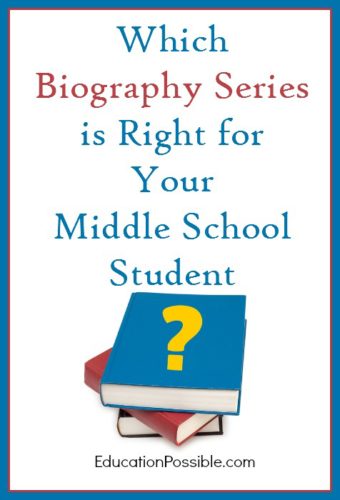
Some good online sources we have used include:
- Biographies for Kids
- Biography.com
- Biography Online
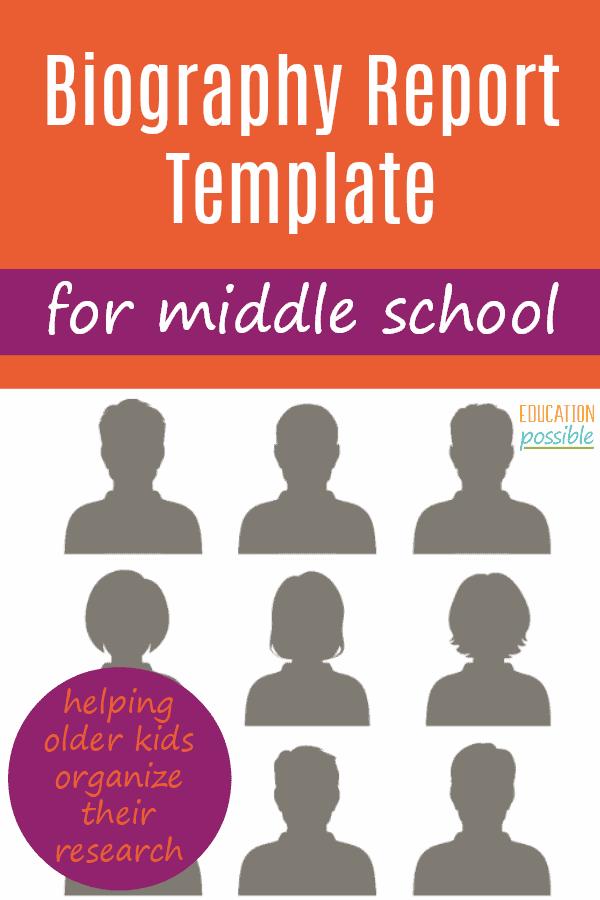
No matter how you decide to do your research, don’t forget to grab a Biography Report Template to make your life easier.
*The free promotion for this has expired, please enjoy this product at a great low price.
Which famous person would your family like to learn mo re about?
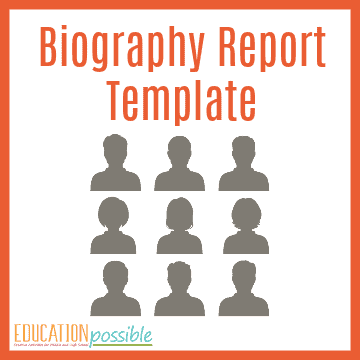
Posts Others Love – and You Will Too!
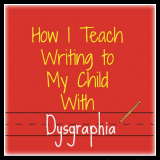
- Pingback: Incredible Homeschool Printable Resources
- Pingback: Which Biography Series is Right for Your Middle School Student?
- Pingback: Tools for Homeschooling Middle School: Teaching History
Comments are closed.
FREE Shipping on all our products! (Please expect 1 to 1.5 weeks for delivery due to transit delays. We ship every day including Saturday
- See Where To Start
- Read Our Story
- Learn About Our Philosophy
- Samples of Our Programs
- Intro To Science
- Summer's Lab
- Learning Through Science
- Grammar Stage from the Classical Science Series
- Sassafras Science
- Science Chunks Units
- Logic Stage from the Classical Science Series
- Physical Science
- Science Chunks
- High School Biology
- High School Chemistry
- Physics Rhetoric
- Holiday Science
- The Science Fair Project
- The Homeschooler's Guide to Experiments
- Classical Science Series
- Sassafras Science Series
- Biology Grammar Stage
- Biology Logic Stage
- Sassafras Zoology
- Sassafras Anatomy
- Sassafras Botany
- Biology Units
- Earth Science & Astronomy for the Grammar Stage
- Earth Science & Astronomy Logic Stage
- Sassafras Earth Science
- Sassafras Geology
- Sassafras Astronomy
- Earth Science & Astronomy Units
- Chemistry Grammar Stage
- Chemistry Logic Stage
- Sassafras Chemistry
- Chemistry Units
- Physics Grammar Stage
- Physics Logic Stage
- Physics Units
- Physics High School
- [email protected]
Your Cart is Empty
- $ 0.00 Subtotal
Taxes and shipping calculated at checkout
All books are shipped via media mail and can take up to three weeks to arrive. All experiment kits are shipped priority mail and may arrive before the books. All eBooks are delivered to your inbox within 5 minutes of your purchase.
5 Simple steps for writing an interesting biography report on a famous scientist
February 06, 2023 4 min read homeschool science homeschool science tips scientist

Learning about famous scientists can deepen our students' appreciation and understanding of science. And so it's important that we add a few biographies and reports on key scientists throughout their homeschooling years.
To help you out with this task, we wanted to share 5 easy steps for writing a biography report on a famous scientist.
5 Easy steps for writing a scientist biography report
We love sharing about the key men and women in science with our students. We usually do this at different stages throughout their journey and this is something we incorporate into our programs. But typically, we recommend that students begin sharing scientist biography reports around third or fourth grade. In this beginning these will be super simple and they'll get more complex as the students get older. But they will all begin with...

Step 1: Choose and read
The first step for writing any scientist biography report is to have the students read about the scientist.
You may have a book, or article, scheduled in your science program, but if you don't have a book already scheduled for you with your science program, simply choose the scientist you would like to study and then head to your local library. The children's literature section generally has a section for biographies, which makes it easy to find a book that will work for your student.
Here is a list of options we have used in the past:
- 100 Scientists who made history (This book has simple articles on a variety of scientists that are great for younger kids.)
- Science Stories Series by Beverly Birch (These are simple biographies also good for younger kids.)
- Who Was series by a variety of authors (There are several scientists in this series, which is good for upper elementary and middle school kids.)
- Living History Library by Jeanne Benedick (There are several scientists in this series, which is good for middle school kids.)
- DK Biography Series (Again, there are several scientists in this series, which is good for middle school and high school kids.)
- DK Eyewitness: Great Scientists (This book has simple articles on a variety of scientists that are great for older kids.)
Once you have your book or article selected, you can read the selection all in one shot or you can break it up over a week or so. If your students are younger, feel free to read the selection out loud. Just be sure to discuss what the students have read, or listened to, each day.
Looking for a unit already put together for you on a scientist? Here are two you can download for free: Mendel and Pasteur.
Step 2: Answers several questions
After the students finish reading the book or the article, have them answer a few questions about the book.
These are the questions we like to ask:
- Who was the scientist you read about?
- When and where were they born?
- What was their major scientific contribution?
- List the events that surround their discovery.
- List some other interesting events in the scientist’s life.
- Why do you think that it is important to learn about this scientist?
Here is a free printable for you to use with your students as they answer these questions:
- Scientist Biography Questionnaire
If your students are younger, feel free to act as their scribe as they answer these questions. The plan is that these questions will serve as a basic outline or a list of facts to pick and choose from when the students go to write their actual reports.
Step 3: Write a rough draft
The day after you answer the questions, review the student's answers and talk about how to structure the report. Your goal may be a simple one-paragraph report or it may be a several-page essay - this really depends upon the students' ages.
Here is a basic structure for a multi-paragraph report:
- One paragraph with the introduction and biographical information on the scientist,
- One paragraph on the scientist's major discovery and the events surrounding the discovery,
- One paragraph on some other events in the scientist's life,
- And a final paragraph that concludes the report and shares why someone should study the scientist.
You can reduce these topics to once sentence for a shorter report or expand them for a longer one.
Step 4: Edit
The day after, or a few days after, the students complete the third step, you need to have them edit their papers.
We read the whole draft together when editing because when we do it this way, my student usually picks up most of the errors on her own. Thus making the corrections hers instead of mine, which saves us quite a few tears. If we don't catch them all this way, I will point out any remaining errors and then we move on.
Then once we have finished editing, we will chat about the format for the final report. We typically give a few options for a scientist biography report.
- A mini-book
- A full-size poster
- Or a standard report
If the students choose to do a mini-book, poster, or lapbook, we will also discuss what the layout of their final project will look like.
Step 5: Prepare the final report
After you finish editing and choosing a layout, the students should pull together their final reports.
This step is fairly easy because of all the work you did in the previous four steps. Basically, the students will take their edited draft and put it in the format you decided upon.
You can choose to grade the report or share it with a group. Either way, your students will gain a deeper understanding of science through the men and women that have shaped the course of the subject through their discoveries!
The Final Product
Choose and read a scientist's biography, answer the questions, write the rough draft, edit, and prepare the final report.
That is how you can write a scientist biography report in five simple steps. Hopefully, you are now inspired to try writing one with your students!
Also in Elemental Science Blog
3 tips for summer science to help you enjoy the season.
June 01, 2024 3 min read

Ahh, the lazy days of summer. Time to sleep in. Time to sit back and relax and sneak in a bit of science with these three tips. Click to "Read More" to see them.
The Index Card System: A Perfect Way to Organize your Science Research
May 20, 2024 2 min read

What is the difference between a report and a research paper for science?
May 13, 2024 2 min read

In the middle school and high school years, students frequently receive assignments for research papers or reports in science and history. But what is the difference? And how to you go about writing both of these? Click "Read More" to get answers.
Sign up to get the latest on sales, new releases and more …
Biography Report Questions

- Word Document File
What educators are saying
Description, questions & answers, brittany totman.
- We're hiring
- Help & FAQ
- Privacy policy
- Student privacy
- Terms of service
- Tell us what you think
Published In: Brief
How to Write a Biography (Examples & Templates)
A biography is a written account of a person’s life that details their life in chronological order. Another person usually writes this detailed account, and it contains reports of their childhood, career, major life events, relationships, and social impact. It also details their relationships with their family, children, and life accomplishments.
The best way to find out more about a popular figure is through reading their biographies, so you need to make sure you get the correct information. Before writing a biography, you need to do a lot of research and interviews to represent a person’s life accurately.
Types of Biography
A biography is the story of someone’s life as written by another writer. Most biographies of popular figures are written years, or even decades, after their deaths. Authors write biographies of popular figures due to either a lack of information on the subject or personal interest.
A biography aims to share a person’s story or highlight a part of their life.
There are different types of biographies, depending on the story. Some biographies are written true to the story, while some are written as fictional works. Biographies can give you true understanding of a person on an internal as well as external level along with a lot of life lessons.
Autobiography
An autobiography is different from a biography because it is written by the subject of the story, themselves. The author writes in the first-person narrative, and it flows step-by-step like a story of their life. Autobiographies contain personal accounts of the subject’s life, along with their perspectives and opinions on events in their life.
How To Write a Biography
Pick a subject.
Picking a subject is the first step in writing a biography. You can pick an already famous person or a relatively unknown person with a great life story. If you already have a few in mind, you can start by asking yourself some questions such as;
- What has the subject accomplished that makes them a good subject?
- Have they had an impact on society?
- Is the subject a celebrity or a well-known personality?
- Will the biography appeal to a wide audience?
Get Permission
When you pick a subject, the next thing to do is to get permission from them or their family or rights owners. Although, with some historical figures, there may not be any need for permission. Getting permission from your subject makes it easier for you to get stories to put into your book. You can get the chance to obtain additional personal stories and anecdotes that will make your book more interesting by doing so as well.
Do The Research
Research is the most important part of a biography’s process as the entire content of the book is dependent on it. Irrespective of what you know about the subject, you need to carry out as much research as possible to get the story’s facts precisely.
Biography research comes from various sources, depending on the book’s subject. Firsthand reports from family, friends, or personal accounts from the subjects are primary sources. They are usually the most accurate and reliable, and they are crucial for a biography. Secondary sources come from other sources like magazines or documentaries.
Pick a Format
Biographies come in various formats, with each of them having their pros and cons. A typical biography will start at the beginning, usually with the birth and childhood of the subject. Yet, if the biography’s theme involves a different event in their life, the author may want to explore the flashback option or one with concurrent events from different times.
Usually, biographies have a theme or a general life lesson at the center. The author’s role is to tell the subject’s story leading up to the major event.
Which-ever format you choose should place the theme at the center, with the other events detailing the journey.
Create a Timeline Of The Story
Since a biography takes place in chronological order, there needs to be a timeline of the events in the right order. The timeline should contain the key events in the subject’s life, in the order the author plans on revealing them. A great way to declutter the story and keep it interesting is to use flashbacks . This way, the author can introduce past events and explain later events excluding the element of monotony.
Add In Your Thoughts
The good thing about biographies is that you don’t have to stick to the hard facts only. As the author, you can share your opinions and emotions in writing. The author has the freedom to do this by commenting on a significant action by the subject in a manner that describes why they feel the subject may have done what they did.
The author can also include commentary on events depicted in the biography – how it was influenced society or its impact on the lives around them. Recounting these events through a different perspective can make the biography more relatable and interesting to read.
FAQ’s
Why is a biography template important.
A biography template has an outline that makes the writing easier for the author. Biography templates usually contain a sample timeline, format, and questions that provide more information about the subject. With a great biography template, you can cut your writing time in half and spend less time coming up with an outline.
How are biographies better in comparison to autobiographies
Since a different person writes biographies, they tend to be more objective and somewhat accurate than autobiographies. An autobiography tells things from the author’s perspective, so their views and perspective cloud it. Thus, a biography will likely tell a more factual story.
These are the important steps you need to take to help you write a great biography. Now, to make things easier for you, we have a free customizable autobiography and biography template that you can use to start your first book. Get the template and start writing today
What are some of the most important elements to keep in consideration while writing a biography?
Any author looking to write a biography must consider the factors below. They aren’t the only important factors, but a biography isn’t complete without them. • Date and place of their birth • Academic background • Professional expertise • Death, if deceased • Facts and anecdotes about the person • Main accomplishments • Detailed accounts of their child and adult life
Biographies tell the untold stories of some incredibly relevant people in the world. But biographies are not always strictly accurate. So, every biographer needs to follow the necessary steps to provide a biography with all the requirements.
Related Documents

IMAGES
VIDEO
COMMENTS
The biography questions listed here are designed to uncover the personal and human side of these figures, providing insights into their daily lives, relationships, and personal philosophies. Students can gain a broader perspective, going beyond the standard facts and dates to truly connect with these individuals on a more personal level.
These questions for biography provide a starting point for your research and interview process. Remember to be respectful, empathetic, and open-minded while gathering information about someone's life. A biography is an opportunity to honor and celebrate an individual's journey, so approach it with care and curiosity. ...
Completing a biography research guide will help your students remain focused and on task. The format and structure of the research guide is based on the needs of your students. Hopefully, the items listed below will point you in the right direction. Cover Page: It's important to review the meaning of the term biography and require students to ...
Here are the top 50 professional biography questions: Personal background questions You can include a few personal details in a professional biography to tell the reader about your background, passions and personality. You can choose to add personal details that relate to your current career to promote cohesion in your biography.
When teaching kids about history, few topics captivate and engage young learners more than biographies. Kids love learning about real people who have made a difference in our lives. Asking the right questions is key for students as they explore the life stories of famous people who lived before them. From answering significant life events
Conduct relevant interviews. Whenever possible, seek firsthand accounts from those who knew or interacted with the subject. Conduct interviews with family members, friends, colleagues, or experts in the field. Their insights and anecdotes can provide a deeper understanding of the person's character and experiences.
Biography Project Discussion Questions Fill in the name of the author you are researching and answer the following questions. You will use this handout during discussions with your group when planning your panel presentation. Author: _____ 1. How does a person become a hero or a role model for others?
The free biography report template provided below can be used as a jumping off point. The websites listed to accompany the research template are student friendly and filled with tons of options for researching an influential figure. If your students do well with the template, it can be used as an outline for an expository writing assignment.
Fordham University Libraries. Walsh Library ♦ Rose Hill Campus ♦ 718-817-3586. Quinn Library ♦ Lincoln Center Campus ♦ 212-636-6050. Fordham Westchester Library ♦ Fordham Westchester Campus ♦ 914-367-3061. [email protected] ♦ text 71-TXTX-1284 ♦ Ask a Librarian (Chat) Last Updated: May 30, 2024 4:08 PM. URL: https://fordham ...
Whether you want to start writing a biography about a famous person, historical figure, or an influential family member, it's important to know all the elements that make a biography worth both writing and reading. Biographies are how we learn information about another human being's life. Whether you want to start writing a biography about ...
Our latest prize book is GOOD NIGHT, IRENE by Luis Alberto Urrea, which releases in paperback on June 4th. This New York Times bestselling novel tells an exhilarating World War II epic that chronicles an extraordinary young woman's heroic frontline service in the Red Cross. The deadline for your entries is Wednesday, June 12th at noon ET. Enter the contest »
Crafting the Body Paragraphs of the Biography Report. When teaching your students to write biography reports, it is important to explain to them what the body paragraphs should include. The body paragraphs should include the major events in the person's life. Read over the body paragraphs from your mentor text and discuss what was included ...
When a teacher assigns a biography as a writing assignment, the purpose is to have a student utilize multiple research tools to gather and to synthesize information that may be used as evidence in a written report about an individual. The evidence gained from research can include a person's words, actions, journals, reactions, related books ...
A good biography report paints a person's life with the same brio and vibrancy, ... You can start with the biography research questions which you can generate ideas from later on. You can also identify important phases in the life of your John or Jane Doe and work his or her biography with those dates. 2. Introduction
Overview. Set the stage for high-interest reading with a purpose through a biography project. Students work together to generate questions they would like to answer about several well-known people, then each student chooses one of these and finds information by reading a biography from the library and doing Internet research.
What is Included in the Biography Collection? 47 Biographies. that include an informational article written for in two formats, vocabulary cards and activities, websites and videos for additional research, graphic organizers, comprehension activities, fact sort, summary page, and writing page. Digital Biographies.
Biographical research in education may be conceived in many different ways; however, typically the topic constitutes the study of a single life, focusing primarily upon an individual who in some way is affiliated with the professional field of education, broadly conceived (Garraty, 1957; Oates, 1986). Other research methodologies are often ...
Biography Report Form Template and Organizer. 920. A biography is the story of a person's life. Because of their unique and personal nature, I often choose to include biographies for middle school in our studies of significant historical events. By reading about someone's personal history and connection to an event, my teens gain valuable ...
Step 3: Write a rough draft. The day after you answer the questions, review the student's answers and talk about how to structure the report. Your goal may be a simple one-paragraph report or it may be a several-page essay - this really depends upon the students' ages. Here is a basic structure for a multi-paragraph report:
Biography report questions divided into three sections for students to create a three paragraph report. Total Pages. Answer Key. N/A. Teaching Duration. N/A. Report this resource to TpT. Reported resources will be reviewed by our team. Report this resource to let us know if this resource violates TpT's content guidelines.
A biography is the story of someone's life as written by another writer. Most biographies of popular figures are written years, or even decades, after their deaths. Authors write biographies of popular figures due to either a lack of information on the subject or personal interest. A biography aims to share a person's story or highlight a ...